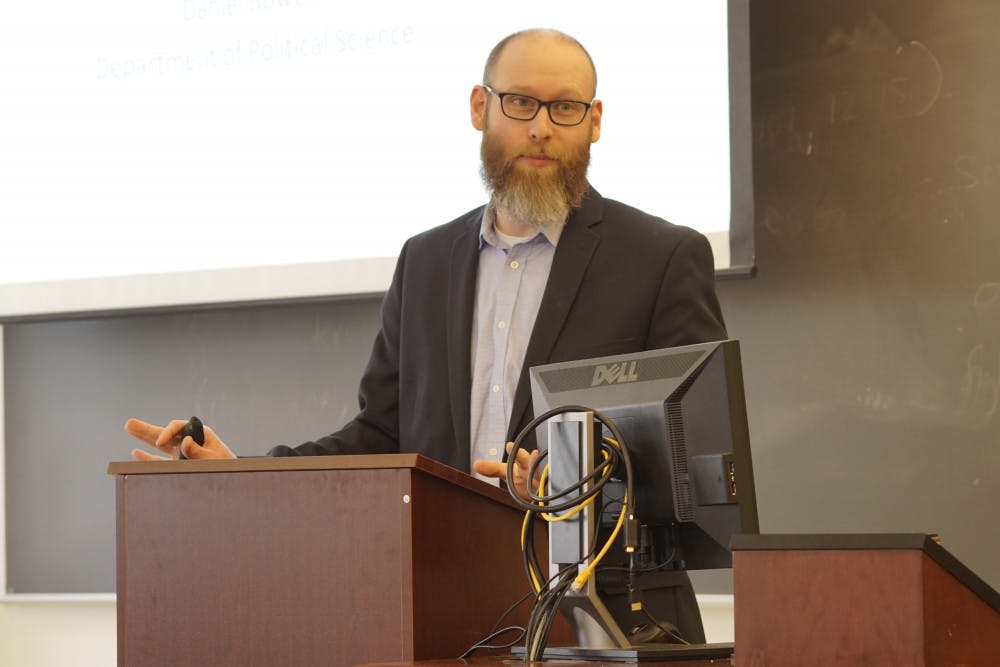By Ariel Steinsaltz
Staff Writer
Daniel Bowen, associate professor of political science at the College, gave a lecture on April 17 titled, “Losing Your Soul To Gain The Presidency? Evangelicals, Identity, and Support for Donald Trump.”
During the hour-long talk, Bowen discussed the history of the Evangelical movement in the U.S. and the group’s voting patterns throughout American history, specifically in the 2016 presidential election.
“American politics is 90 percent social identity,” Bowen said. “We have different identities — we have conflicting identities. We tend to vote the way our parents voted. We tend not to switch parties in our lifetime.”
Bowen said at the beginning of the lecture that he studies elections and public opinion, and he was raised Evangelical and attended an Evangelical college.
“I think Evangelicals are one of the most important segments of the Republican party, so I wanted to understand it better,” he said.

The lecture began with a brief history of the Evangelical movement. Bowen explained how it has roots in the Second Great Awakening, which took place at the turn of the 19th century.
Nearly every Protestant denomination in the U.S. has an Evangelical sector, according to Bowen. Evangelicals believe in the accuracy of the Bible, and many of them believe strongly in sharing their views with others.
In the mid-19th and early 20th centuries, there were many changes in American life, and Protestants had largely split between Liberals and Evangelicals. The Evangelicals then further split into mainstream Evangelicals and Fundamentalists. Liberals wanted to accommodate change, while Fundamentalists believed in purity and separation from society. Mainstream Evangelicals believed in personal salvation and became a conservative political force.
By the mid-20th century, Evangelicals were losing influence, but there was a resurgence of the movement in the 1970s and 1980s with reactions to Supreme Court cases such as Roe v. Wade.
Evangelical television shows began talking about politics during this time with the election of former President Jimmy Carter, who was an Evangelical. Evangelicals began to vote on what they considered moral issues, such as abortion, gay marriage and prayer in schools. Evangelicals rose to be core members of the Grand Old Party.
According to Bowen, it was expected that Evangelical support for the GOP would decrease in 2016 due to the candidacy of President Donald Trump, who seemed to go against the values the Evangelicals stood for — he has been married multiple times, had extramarital affairs and has misquoted the Bible.
Despite this, 80 percent of Evangelicals voted for Trump, contributing to his victory.
“What I would like to ask is, ‘Why?’” Bowen said.
Bowen cited several possible factors in the large Evangelical turnout for Trump — a compositional factor, or how Evangelicals differ from other populations, causal factors or ways that Evangelicalism has theologically or socially been led to support Trump and coalitional factors, which are the ways that the GOP and religious leaders stress cultural identities to keep Evangelicals voting in their favor.
When discussing the coalitional effect, Bowen showed a clip of Tony Perkins, president of the family research council, explaining how Trump has made it OK to say “Merry Christmas” again, and claiming that liberals have attacked religious freedom.
Compared to other religious groups, Evangelicals are often poorer, less educated and attend church more often. They are more likely to be from the South, they are more likely to be against abortion and gay marriage, and they are the most likely religious group to harbor racial resentment, according to Bowen.
It is also important to note that it is white Evangelicals who primarily support Trump — Bowen explained that black Evangelicalism is a separate movement.
When controlling for demographics, church attendance, party identification and attitudes, there was no statistically significant difference in voting patterns between Evangelicals and other white Christians, but party identification and attitudes are affected by religion, Bowen explained.
There is a shared identity between Evangelical and GOP leaders –– James Dobson, founder of the conservative group Focus on the Family, claimed that Trump had had a conversion experience. Evangelical leaders often give the GOP support in exchange for political favors and they are open about this strategy, according to Bowen.
Evangelicalism was shown to have a significant effect on Republicans who did not like Trump, but were driven to vote for him as a matter of principle, Bowen explained.
“It’s important to remember that this coalition we call Evangelicals is still diverse theologically, diverse regionally,” Bowen said.







